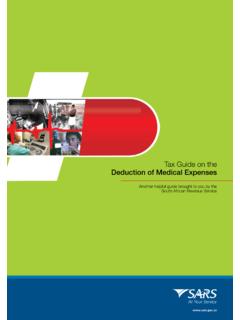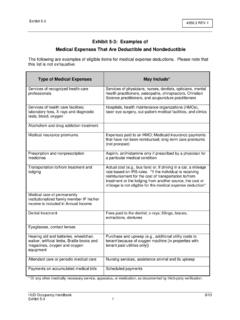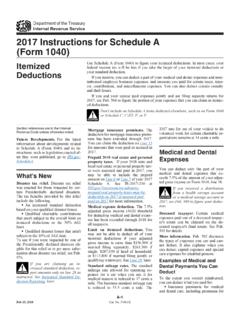Transcription of STATE TAX INCENTIVES FOR LONG-TERM CARE …
1 STATE TAX INCENTIVES . FOR. LONG-TERM care INSURANCE. STATE Credit/Deduction Alabama Deduction A deduction is allowed for the amount of premiums paid pursuant to a qualifying insurance contract for qualified long - term care coverage. [Code of Ala. 40-18-15(27)(1996)]. Arkansas Deduction Adopts section 213 of Internal Revenue Code for computing medical and dental expense deduction under STATE income tax law. [Ark. Code Sec. 26-51-423 Reg. (a)(2)]. California Deduction A deduction is allowed to the extent provided in the federal Internal Revenue Code. [Cal. Rev. & Tax Code ' 17201. (1996)]. Colorado Credit A credit is allowed in taxable years on or after January 1, 2000, for 25 percent of premiums paid for LONG-TERM care insurance or $ per policy.
2 The credit will be available to only individual tax payers with taxable income of less than $50,000 or two individuals filing a joint return with taxable income of less than $100,000. [ 39-22-122. (1999)]. District Of Deduction Effective 1/21/05, permits a deduction from gross income the amount an individual pays annually in LONG-TERM care Columbia premiums, provided that the deduction shall not exceed $ per year, per individual, whether the individual files individually or jointly. [Section (b-1) of the DC Official Code]. Hawaii Deduction For tax years beginning on or after 1/1/99, an individual STATE tax deduction is allowed for LONG-TERM care insurance premiums.
3 A deduction is allowed for premiums paid for LONG-TERM care insurance to the extent such premiums are deductible in determining federal taxable income beginning in taxable years after December 31, 1998 and is also only available to the extent that all medical expenses, including LONG-TERM care exceed of Hawaii Adjusted Gross Income. [HRS Sec. , (1999)]. Idaho Deduction A deduction is allowed for taxable years beginning on or after January 1, 2004 for the premiums for LONG-TERM care insurance as defined in section 41-4603 Idaho Code. For tax years beginning on or after January 1, 2004, allows an individual taxpayer to deduct the full amount of premiums paid for LONG-TERM care insurance for the taxpayer, a dependent or an employee.
4 The deduction may be taken for a federally tax-qualified LONG-TERM care insurance policy meeting Idaho's definition of LONG-TERM care insurance. (Prior law allowed for a taxpayer to deduct 50 percent of the costs for premiums, effective 1/1/2004, the limitation is removed, and the full amount of the premium may be deducted.) [Chapter 30, Title 63, Sec. 63-3022Q (2004) Reg. 41-4603]. i Updated 2/05/08 Copyright American Council of Life Insurers, 101 Constitution Avenue, NW, Washington, DC 20001-2133. All rights reserved. Page STATE Credit/Deduction Indiana For tax years beginning on or after January 1, 2000, an individual taxpayer is permitted to deduct an amount equal to the eligible Deduction portion of premiums paid during the taxable year by the taxpayer for a qualified LONG-TERM care policy (as defined in the Indiana Code, for the taxpayer, the taxpayer's spouse, or both FOR QUALIFIED PARTNERSHIP POLICIES.)
5 ONLY. [Ind. Code Secs. ]. Iowa Deduction A deduction is allowed for tax years beginning on or after January 1, 1997, for premiums for LONG-TERM care insurance for nursing home coverage to the extent the premiums for LONG-TERM health care services are eligible for the federal itemized deduction for medical and dental expenses. Adopts section 213 of Internal Revenue Code for computing medical and dental expense under STATE income tax law. [IAC Chapter 40, ' (422); IAC ' (1997)]. Kansas Deduction A deduction for tax years beginning after 12/31/04 is allowed up to $500 of qualified LTC premium costs. The deduction increases by $100 each year to a maximum of $1,000.
6 ( 2000 supp. 79-32 117(c)(xvi)2004). HB 2545. Kentucky Exclusion Exclusion For tax years beginning on or after January 1, 1999, a taxpayer may exclude from Kentucky Adjusted Gross Income any amounts paid for LONG-TERM care insurance as defined in the Kentucky code.[ Ky. Rev. Stat. Sec. (10)(m) Reg. & 610 ]. Maine Deduction A deduction is allowed for an amount equal to the total premium spent for insurance policies for LONG-TERM care that have been certified by the Superintendent of Insurance as complying with Title 24-A, Chapter 68. For tax years beginning on or after 1/1/04, a taxpayer may tax a STATE income tax deduction an amount equal to the total premiums spent for LTC insurance, as long as the amount subtracted is reduced by any amount claimed as a deduction for federal income tax purposes.
7 [36 Me. Rev. Stat. Sec. 5122] Amended 5/11/04 [Title 36, Part 8, Chapter 805, Sec. 5122. (1989)]. Credit For employers, a credit is allowed against the tax imposed for each taxable year equal to the lowest of the following: (A) $5,000; (B) 20% of the costs incurred by the taxpayer in providing LONG-TERM care policy coverage as part of the benefit package; or, (C) $100 for each employee covered by an employer provided LONG-TERM care policy. [Title 36, Part 4, Section 2525, Chapter 357 (1996)]. Maryland Credit A credit is allowed against the STATE income tax for employers providing LONG-TERM care insurance up to an amount equal to 5 percent of the costs incurred by the employer during the taxable year for providing LONG-TERM care insurance as part of the employee benefit package.
8 The credit may not exceed $5,000 or $100 for each employee covered by LONG-TERM care insurance under the employer benefit package and it is applicable to all taxable years beginning after 12/31/98. [Ins. Art. 6-117, Chapter 7 (1998)] Md. Tax Code Sec. 10-710. ii Updated 2/05/08 Copyright American Council of Life Insurers, 101 Constitution Avenue, NW, Washington, DC 20001-2133. All rights reserved. Page STATE Credit/Deduction Maryland A one-time credit is allowed in the amount equal to 100% of the eligible federally qualified LONG-TERM care insurance (cont.) premiums covering the individual, spouse, parent, step-parent, child, or step-child, not to exceed $500 effective July 1, 2000 for taxable years beginning after December 31, 1999.
9 [Chapter 242, Section 10-718 (2000)]. Credit For tax years beginning on or after January 1, 1999 A credit is allowed for LONG-TERM care insurance premiums during Minnesota the taxable year equal to (1) 25% of premiums paid to the extent not deducted in determining federal taxable income;. or, (2) $100. Maximum allowable credit per year is $200 for couples filing jointly and $100 for all other filers. [Sec. 21, Sec. subdivision 2 (2000)]. Mississippi Credit As of January 1, 2007, a taxpayer is allowed a credit against the income taxes imposed under this chapter in an amount equal to 25% of the premium costs paid during the taxable year for a qualified LONG-TERM care insurance policy as defined in Section 7702B of the Internal Revenue Code that offers coverage to either the individual, the individual's spouse, the individual's parent or parent-in-law, or the individual's dependent as defined in Section 152 of the Internal Revenue Code.
10 No taxpayer is entitled to the credit with respect to the same expended amounts for qualified LONG-TERM care insurance which are claimed by another taxpayer. The credit allowed by this section shall not exceed $500 or the taxpayer's income tax liability, whichever is less, for each qualified LONG-TERM care insurance policy. Any unused tax credit shall not be allowed to be carried forward to apply to the taxpayer's succeeding year's tax liability. No credit shall be allowed under this section with respect to any premium for qualified LONG-TERM care insurance either deducted or subtracted by the taxpayer in arriving at his net taxable income under this section or with respect to any premiums for qualified LONG-TERM care insurance which were excluded from his net taxable income.





